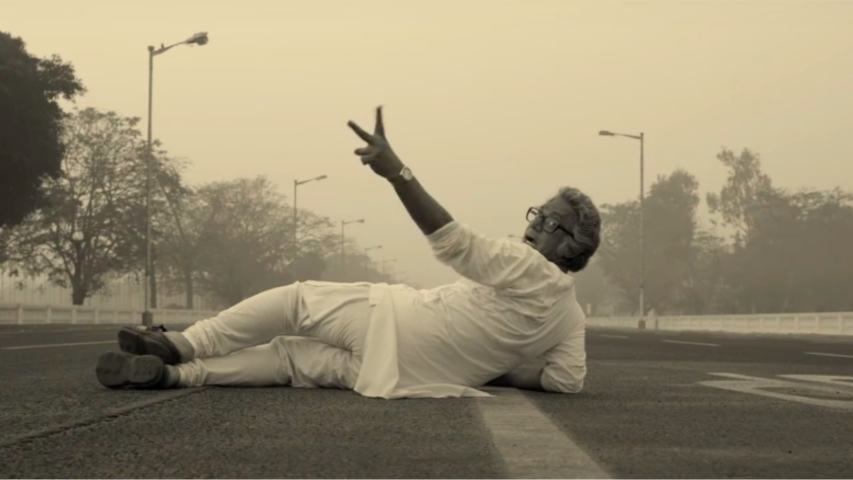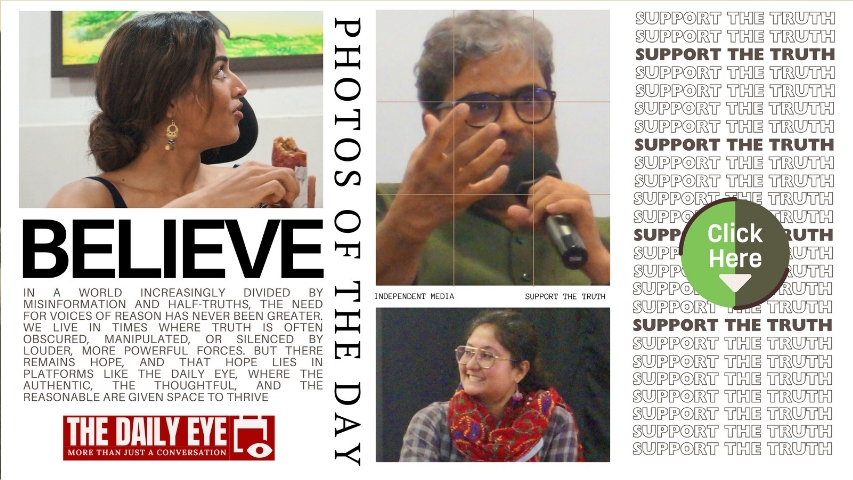
ALTERNATIVE ENTERTAINMENT: THE FILMMAKER, THE ETERNAL SEEKER
by Shantanu Ray Chaudhuri October 9 2024, 12:00 am Estimated Reading Time: 6 mins, 28 secsAs it completes a 50-day run, Shantanu Ray Chaudhuri looks at Srijit Mukherji’s Padatik and how it stands out in the barren landscape of Indian biopics. Padatik, masterful exploration of Mrinal Sen's life and cinematic legacy.
Padatik, directed by Srijit Mukherji, offers a captivating portrayal of the legendary filmmaker Mrinal Sen, known for his groundbreaking work in Indian cinema. This biopic highlights Sen's maverick approach to storytelling, his personal struggles, and his enduring influence on global cinema. Featuring a stellar performance by Chanchal Chowdhury and a unique narrative style, Padatik skilfully balances Sen's artistic journey with his complex personal life. For fans of Indian biopics, filmmaking enthusiasts, and cinephiles, this film presents an unmissable tribute to one of cinema's true pioneers.
The Challenge of Indian Biopics
I am wary of biopics. Indian biopics are more often than not PR exercises that rarely scratch the surface, let alone make a deep dive into the subject, warts and all. The biopic as a genre is probably one that demands making a virtue of eulogy. However, if one were to assess a life from Indian biopics across the spectrum – sports, politics, business – one would almost think that the subject was/is free of all human vices (unless, of course, it is a politically driven tract like An Accidental Prime Minister, where the protagonist has little to redeem himself).
When it comes to a man like Mrinal Sen, your antenna gets sharper. Here was a filmmaker known as the ‘enfant terrible’ of Indian cinema, a ‘maverick maestro’, a filmmaker who defied conventions of cinematic narration and pioneered new ways to tell a story, whose work frustrated and wowed in equal measure, whose authorized biography (which I was privileged to publish) was called Sixty Years in Search of Cinema. A man who questioned himself, the very tenets of his cinema, at every stage. How do you convey the ‘maverick-ness’ of a man? What do you do to bring his cinema to life? How do you question a man who kept questioning himself? How do you convey in film the life of a man who even after sixty years of international fame as a filmmaker was still ‘searching for cinema’?

Srijit Mukherji's Triumph in Padatik
Srijit Mukherji has a go at it and comes out trumps most of the way. Padatik not only highlights Sen’s cinematic achievements but also delves into the personal experiences that shaped his vision and narrative style. Unlike Anik Dutta’s Aparajito, which made a hash of Satyajit Ray with its bland narrative and framing device, Srijit creates an engaging drama of his protagonist, using some of Mrinal Sen’s cinematic techniques. One of his major achievements in the film is the way he brings forth the essence of Sen’s life and cinema as the ‘eternal traveller’. Watching him frame Ray and Sen in their engagements and disagreements, one gets the palpable sense of the difference that marked the approaches – to both life and cinema – of these two giants: Ray would probably never see himself as a padatik. Sen was never anything but one.
Srijit is, of course, helped immensely by his leading man here – Chanchal Chowdhury – who breathes Sen into every frame. The actor’s striking resemblance to Mrinal Sen – a shout-out here to Somnath Kundu’s virtuoso make-up feats – often blurs the lines between actor and subject, which I found rather captivating. But unlike Aparajito, where beyond Jeetu Kamal’s striking resemblance to Ray little worked, Srijit has the narrative heft to back the actor’s likeness.
Artistry and Missed Opportunities
Srijit skilfully narrates Mrinal Sen’s story, emphasizing his unconventional approach to filmmaking. One poignant quote from Sen resonates throughout the film: ‘Aami filmmaking cheede debo. Aami golpo bolte seekhi nai, ami golpo bolte parbo na.’ (I will give up filmmaking, I haven’t learned how to tell a story – I cannot tell a story.) This humility, this ability to question his convictions, underscores his dedication to his craft, suggesting that storytelling is an art that transcends technical prowess. The opening scene sets the tone, featuring an older Mrinal Sen stepping out of his room amidst the set of the ruins from one of his films. This moment encapsulates his belief that ‘Cinema-r ek paa bastobe aur ek paa fantasy te, orthat maya,’ highlighting the dual nature of cinema as both reality and illusion.
In keeping with a large body of Sen’s work, the film employs a distinctive non-linear storytelling style that I found engaging, often breaking the fourth wall. Korak Samanta, playing the younger Mrinal Sen, introduces himself while travelling on a tram (no guesses or surprises here about the reference, for those who know Sen’s work), and as his segment concludes, he de-boards, making way for Chanchal Chowdhury to board in a metro train, further immersing the audience in the narrative. Another outstanding connection is made with Korak using a tonga – a direct reference to Sen’s film Bhuvan Shome. The weaving in and out of snippets of Sen’s work makes the narrative come alive.
However, if there’s one issue I have with the film, it is that it could have experimented a little more with the visual style. There are moments when the proceedings become a listing of the people he met – most awkwardly the scene with ‘Amitabh Bachchan’ that simply does not work. Or the sequence involving Tagore’s last journey that shaped Sen’s worldview. I have read Sen’s own description of this and his biographer’s take on the incident. And though Srijit manages to convey the madness of the uncontrollable crowd – the attention to detail here is exemplary with a man trying to pluck Tagore’s hair – the tragedy of the unknown man losing his infant baby to the marauding crowds is probably well-nigh impossible to film. Maybe that’s a call Srijit could have taken.
But that’s a small lacuna in an otherwise brave film – brave because it does not shy away from the protagonist’s failings, as a partner (refer to his total lack of understanding about what his wife is going through in the absence of food at home), maybe even as a father. Unlike in Anik Dutta’s film, which had the abysmal framing of a critic interviewing Ray entirely uncritically, in Padatik, the presence of Sen’s son, Kunal, never hero-worshipping his father, often asking uncomfortable questions, adds an important subtext to the character. And where else can you hope to see the holy trinity in the same space? That scene alone, purely existing as it is, should suffice for the cine buff.
It is probably impossible to bring to life the complexities and nuances of a filmmaker who opines ‘Golpo ta je bhabe bolte chai sei bhabe bolbo, karun bhorpet khabar theke shanti te ghomono ta onek beshi jorori’ (I will tell my story the way I want to because it is more important to sleep with a sound conscience than on a full stomach) or someone who was disdainful of how posterity would view him: ‘Kintu shudhu matro mahakale mukuter lobhe ami bortomaner songe beyimani korte parbo na’ (I can’t betray my present for all the riches of the afterlife). Srijit’s Padatik gives as good an insight as you can hope for into a filmmaker whose work continues to resonate deeply in the world of cinema.





-173X130.jpg)
-173X130.jpg)

-173X130.jpg)
-173X130.jpg)
-173X130.jpg)
-173X130.jpg)
-173X130.jpg)